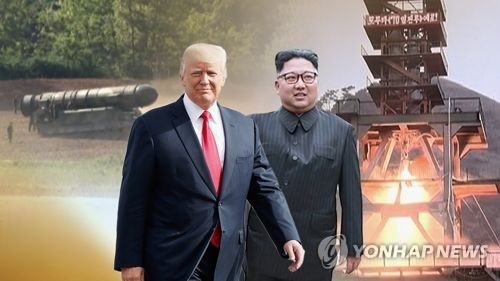- California Assembly OKs highest minimum wage in nation
- S. Korea unveils first graphic cigarette warnings
- US joins with South Korea, Japan in bid to deter North Korea
- LPGA golfer Chun In-gee finally back in action
- S. Korea won’t be top seed in final World Cup qualification round
- US men’s soccer misses 2nd straight Olympics
- US back on track in qualifying with 4-0 win over Guatemala
- High-intensity workout injuries spawn cottage industry
- CDC expands range of Zika mosquitoes into parts of Northeast
- Who knew? ‘The Walking Dead’ is helping families connect
U.S. sanctions 16 entities, individuals over N. Korea’s nuclear program
By Lee Haye-ah
WASHINGTON, Aug. 22 (Yonhap) — The United States on Tuesday announced new sanctions on 16 entities and individuals, mainly from China and Russia, for their alleged ties to North Korea’s nuclear weapons program.
The designations complement a recent U.N. Security Council resolution sanctioning North Korea for its two intercontinental ballistic missile tests in July.
They are all based in China and Russia with the exception of one individual from North Korea, one Namibian company under North Korean control, one Namibian entity under Chinese control, and two companies based in Singapore.
“Treasury will continue to increase pressure on North Korea by targeting those who support the advancement of nuclear and ballistic missile programs, and isolating them from the American financial system,” Treasury Secretary Steven T. Mnuchin said in a statement. “It is unacceptable for individuals and companies in China, Russia, and elsewhere to enable North Korea to generate income used to develop weapons of mass destruction and destabilize the region.”
Under the new measures, any property or interests belonging to the designated persons, which are in the possession or control of American citizens or within the U.S., must be blocked, according to the statement.
Americans are also “generally prohibited” from dealing with them.
 This image shows U.S. President Donald Trump (L) and North Korean leader Kim Jong-un. (Yonhap)
This image shows U.S. President Donald Trump (L) and North Korean leader Kim Jong-un. (Yonhap)
The sanctions were drawn up in response to North Korea’s “ongoing development of weapons of mass destruction, violations of United Nations Security Council Resolutions, and attempted evasion of U.S. sanctions,” the statement said.
The targeted individuals and companies are suspected of assisting people already sanctioned for their ties to North Korea’s nuclear and ballistic missile programs, dealing in the North Korean energy trade, facilitating its exportation of workers, and enabling sanctioned North Korean entities to access the U.S. and international financial systems.
North Korea has balked at all sanctions against the regime.
After the U.N. Security Council’s adoption of new sanctions on Aug. 5, it threatened to retaliate against the U.S. Those sanctions banned North Korean exports of coal, iron, iron ore, lead, lead ore and seafood.
They were designed to starve the regime of resources to develop its nuclear and ballistic missile programs by slashing its annual export revenues by a third.
Tensions escalated further when U.S. President Donald Trump threatened to unleash “fire and fury” on Pyongyang, and the regime responded with threats to fire ballistic missiles towards the U.S. territory of Guam.
It is the second time in less than two months that Washington has slapped so-called secondary sanctions on third-country entities and individuals suspected of aiding Pyongyang’s weapons program.
In June, the U.S. blacklisted a bank, shipping firm and two individuals from China.
In total, the U.S. has blacklisted 23 entities and 22 individuals linked to North Korea since the launch of the Trump administration in January.
“We are taking actions consistent with U.N. sanctions to show that there are consequences for defying sanctions and providing support to North Korea, and to deter this activity in the future,” Mnuchin said.
















Harvard Case Solutions
December 31, 2017 at 9:59 PM
I’m getting excited about this kind of beneficial information of your stuff in the future
Database Assignment Help
December 31, 2017 at 10:00 PM
They are not able to finish the writing assignments on time. For some students, writing any writing assignments is able to waste their time